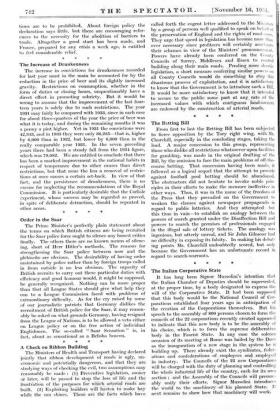The Increase of Drunkenness The increase in convictions for drunkenness
recorded for last year must in the main be accounted for by the reduction in the price of beer and its slightly increased gravity. Restrictions on consumption, whether in the form of duties or closing hours, unquestionably have a direct effect in promoting sobriety. But it would be wrong to assume that the improvement of the last four- teen years is solely due to such restrictions. The year 1931 may fairly be compared with 1933, since in each case for about three-quarters of the year the price of beer was what it is today, and during the remaining months it was a penny a pint higher. Yet in 1931 the convictions were 42,343, and in 1933 they were only 86,285—that is, higher by 6,000 than in 1932, but lower by 6,000 than in the really comparable year 1931. In the seven preceding years there had been a steady fall from the 1924 figure, which was 79,082. We are entitled to conclude that there has been a marked improvement in the national habits in respect of temperance due to other causes than direct restrictions, • but that none the less a removal of restric- tions at once causes a certain set-back. In view of that fact, and the persistence of drunkenness, there is no excuse for neglecting the recommendations of the Royal Commission. It is particularly desirable that the Carlisle experiment, whose "success may be regarded as proved, in spite of deliberate detraction, should be repeated in other areas. *






































 Previous page
Previous page